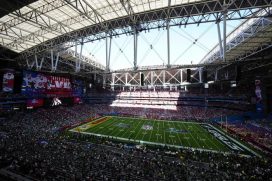Patrick Causey, on Twitter @InsdeTheHuddle
Nate Allen, Earl Wolff, Jaiquawn Jarrett, Quintin Demps, Macho Harris, Sean Considine, Kurt Coleman, Colt Anderson, Jarrad Page, and David Sims.
Reading that list brings a trip down memory lane that every Philadelphia Eagles fan would just as soon forget. But for the last six years, these are just some of the names that the Eagles turned to in order to fill the void at safety left by Brian Dawkins. Needless to say, the Eagles utterly failed to accomplish that goal.
All that started to change in the 2014 offseason. The big ticket free agent at the time was Jarius Byrd, the Pro Bowl safety that inexplicably was allowed to test free agency by the Buffalo Bills. Eagles fans obsessed over Byrd on message boards and comment sections on articles, leaving the impression that Byrd was the second-coming of Ronnie Lott.
But Byrd elected to take his talents to New Orleans, signing with the Saints for a staggering six year, $54 million contract.
The Eagles instead signed Malcolm Jenkins away from the Saints for a three year, $16.5 million deal. The Eagles cited Jenkins versatility — his ability to play safety but also line up in the nickel– as the reason that he was their primary target. At the time, many fans and media members considered the move a let down. A bandaid solution to a flesh wound that has been unattended for far too long.
To say that the Eagles made the right move picking Jenkins over Byrd is an understatement. Jenkins has yet to miss a single game for the Eagles and is the 11th best safety in the league according to PFF.com. Byrd has played in only four of 19 games for the Saints and is one of the biggest free agency busts in recent memory.
The Eagles came into this offseason with the stated goal of upgrading their secondary. They jettisoned the three stooges of the Eagles secondary woes, Nate Allen, Carey Williams and Philadelphia's favorite punching bag, Bradley Fletcher. They spent three drafts picks on corners – including a second round pick on Utah's Eric Rowe. They elevated Nolan Carroll, who curiously was unable to beat out the embattled Fletcher last year. They signed E.J. Biggers and Walter Thurmond.
But they did not bring in any high priced free agent safety. They tried their best, offering a Byrd-like contract to free agent Devin McCourty. But he rejected the deal, opting to take less money to stay with the defending Super Bowl champions New England Patriots.
Eagles fans were incensed. How could the team neglect the safety position again?
When Thurmond announced that he was making the switch to safety, it was met with a lukewarm response. Thurmond had never played a single game in his football career — not in the pros, college or high school — at the safety position. To make matters worse, Thurmond was a walking injury waiting to happen, having played in only 36 of 80 possible games in his career.
Few thought this experiment would work, and no one thought it would be, at least to this point, a resounding success.
Boy were we wrong.
Thurmond is currently the third ranked safety in all of football according to PFF.com. But I don't need advanced metrics and scouting to tell you what the eyes plainly see on Sunday: the Eagles seem to have finally solved the safety riddle that has befuddled this team since 2008.
Thurmond and Jenkins have been an absolute revelation, making plays in both the run and pass game like we have not seen since Dawkins was in his prime and he was joined by the perennial underrated Quintin Mikell.
Thurmond and Jenkins provide Billy Davis the versatility he so ardently desires in order to run his preferred defense.
Take this 3rd and 1 against the Atlanta Falcons with two minutes left the 4th quarter, and the Eagles down 26-24. The Falcons are in max protection: two tight ends, a fullback and running back, determined to run the ball down the Eagles throats. But Jenkins blows through the line and tackles Tevin Coleman for a four yard loss.
It was a critical play at a critical spot in the game. Had the Falcons got the first down, they likely would have been able to run out the clock, since the Eagles only had one timeout and the two minute warning remaining. But they never got that opportunity, as Jenkins made a play on the ball and enabled the Eagles offense to get the ball back with a shot to take the lead.
Earlier in the game, Jenkins covered an unbelievable amount of ground to knock a pass incomplete (vine courtesy of Fran Duffy of PhiladelphiaEagles.com):
Watch two things when looking at this play: the amount of distance Jenkins covers to make the play (a good 15 yards by my calculation), but more importantly, look at how early in the play Jenkins recognizes the route and makes a break on the play.
That combination of athletic ability, range and intelligence is something the Eagles have sorely lacked from their safeties.
Jenkins has been just as good, if not better. When asked why Kelly wanted Thurmond to play safety, he stated that it was because Thurmond was "always around the ball."
There is no better example than this critical interception against the New York Jets with just under four minutes left in the game.
The Eagles offense had struggled mightily for the second half; failing to build on their 24-0 lead. The Jets were inside Eagles territory and were threatening to make an already close game — 24-14 at the time — even closer.
But Thurmond makes a great play to grab the tipped ball and drag both feet inbounds.
Simply put: Nate Allen, Kurt Coleman or Macho Harris would not have been able to make this play.
Perhaps there is no better way to illustrate the positive impact Jenkins and Thurmond have had on this defense than to look at Football Outsiders Defensive Efficiency rankings (rankings which are, in my humble opinion, much more accurate and reliable than PFF).
In 2013, without Jenkins or Thurmond, the Eagles pass defense was ranked 25th in the NFL.
In 2014, with Jenkins in the fold (but not Thurmond), the Eagles pass defense improved to 18th in the NFL.
So far in 2015, with both Jenkins and Thurmond, the Eagles have the 5th ranked pass defense in the entire NFL.
There are a number of factors that contribute to this improved play outside of the safeties: new secondary coach Corey Undlin deserves a lot of credit, the pass rush has been better, and so too has the play of the corners.
But make no mistake: the primary reason the Eagles secondary has looked markedly better this year is because it finally figured out the safety position. Now we just have to hope that the safeties — especially Thurmond — can stay healthy. Because the depth of this position is probably the weakest of any position on the team. Outside of Thurmond and Jenkins, the Eagles have special teams ace Chris Maragos and a physically gifted but raw prospect in Jerome Couplin. In other words, they got nadda.
But for now, let's enjoy the Eagles newfound competence at safety. It's something we have not had for over six years.







